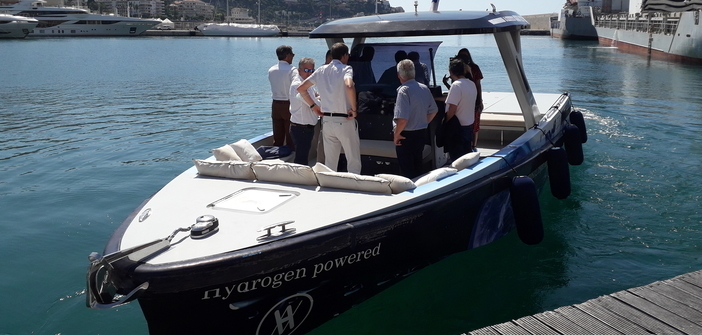Its founder, Cloé Zaied, made a brief stop at the port of Nice yesterday. This tour is a world first. It includes eight stages from Marseille to Monaco. Its mission is to travel the world to demonstrate one thing: that hydrogen is an energy carrier capable of compensating for the intermittency of renewable energies.
“Ecology is transversality.” These words from the health and ecology deputy, Richard Chemla, perfectly summarize the philosophy of this project. It inspires hope and ambition. For Chloé Zaied, the long-term goal is not to create a war fleet composed solely of hydrogen ships. “Our boat is not going to save the world. The primary goal is to use this boat as an educational tool. Each of our stops allows us to invite schools. Acclimatization to hydrogen is essential. This will help spotlight this industry.”
For this pioneer, it’s only the beginning. There is still much to discover and improve to achieve good results. Criticism will, of course, have to be faced. “We said the same thing about solar-powered planes. Thirty years later, we have airbuses that are less polluting than before,” recalls Richard Chemla.
An innovative and sustainable technology
Hydrogen has both fans and detractors. The method used to produce this energy is often criticized. Sometimes it can be methane. The downside of this technique is that it releases a significant amount of carbon dioxide (CO2). The goal of this small ship is decarbonization to reach the net zero mark. To have the greenest hydrogen possible. That’s what Cloé Zaied explains. “We hoped to make a boat with the performance of a combustion engine boat. The only things we emit are water and heat.”
The principle is as follows: “There are three hydrogen tanks. They only serve to store the hydrogen. They are under pressure at 500 bar (a unit to measure pressure). A hydrogen refill takes 25 minutes. It then passes through the fuel cell. It creates an electrochemical combustion. In short, it produces electricity when it comes into contact with the hydrogen naturally present in the air. In terms of production, it produces 46 liters of distilled water per hour. The electricity then goes to the battery bank. They subsequently power the motor,” details the president of Hynova.
The materials used are equally ingenious. Flax or bamboo fibers can be used for the hull to drastically reduce the carbon footprint. “We want to consider the boat’s lifecycle. We didn’t want to make an ecological boat. But rather a boat that tries to have the least possible impact on the environment.”
A sensation of absolute calm
When you set sail, you become aware of the advantage of this boat. “It emits almost no vibrations and remains silent.” Only the sound of the sea rocks you during your journey. You notice the sound and deep notes of the sea as it hits the boat. This proves that when you respect the environment, Poseidon knows how to give back.
You will have the chance to enjoy the Mistral, which makes its presence felt despite the speed. “This nine-ton boat has an autonomy of 10 to 12 hours.” Obviously, this parameter can change depending on people’s needs. Thus, you can reach around 25 knots [45 km/h] for 40 minutes or 12 knots [20 km/h]. All for a maximum power of 60 KW. Finally, if you have the soul of a “nose,” you can enjoy the scent of the ocean as far as the eye can see. How is this possible? Simply because this vessel doesn’t emit unpleasant odors.


